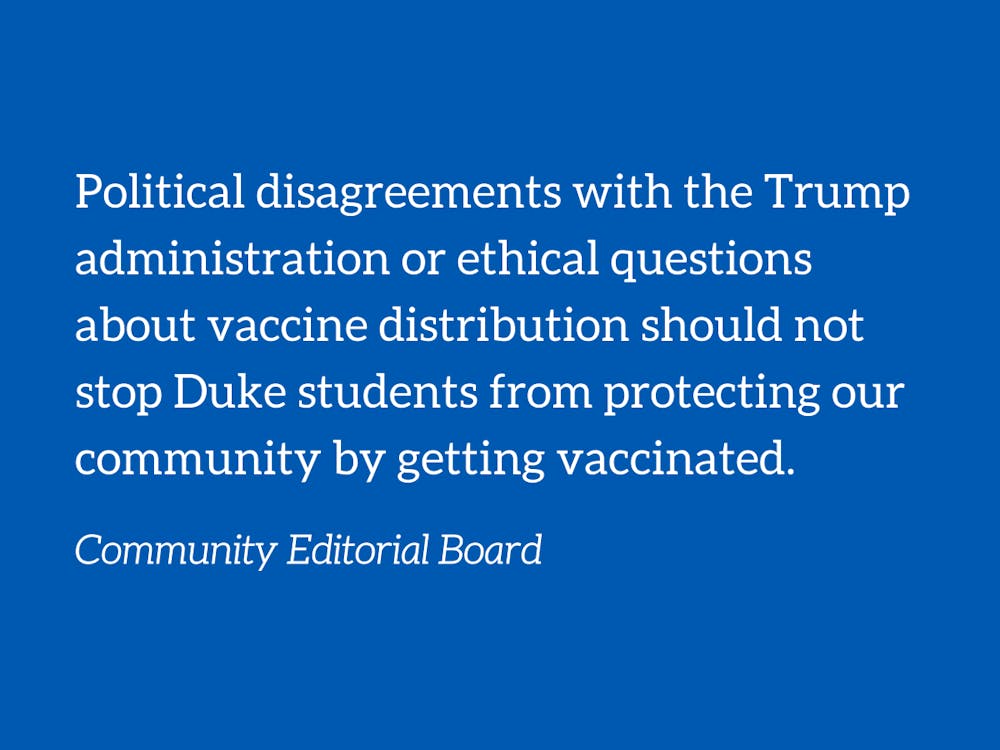Blue Devils are presumed to be smart, well-informed, and rational. When it comes to a potential coronavirus vaccine, however, there is a growing concern for the level of anti-vaxxer attitudes expressed on campus. In this way, Duke students are no different than the 51% of Americans who will refuse to get a coronavirus vaccine after it becomes available.
Duke’s coronavirus vaccine skeptics come in two forms. On one hand, many students are concerned about the rushed vaccine development process. They believe that the Trump Administration will interfere with on-going clinical trials and approve a vaccine that may not be safe or fully tested. A second group of students argue that it would be unethical to take a coronavirus vaccine before it is given to those on the frontlines of America-under-lockdown: health care workers, first responders and vulnerable or marginalized populations. While both groups raise important questions regarding Trump’s handling of the pandemic as well as equitable vaccine distribution, we emphatically say: get the vaccine.
The first form of vaccine skepticism begins with the Trump administration’s Operation Warp Speed. Admittedly, the name is quite puzzling; what steps are the Trump Administration cutting from the testing process to achieve “Warp Speed”? The program, however, does not eliminate any steps in the testing process. Rather, it accelerates development by concurrently funding the research and production of vaccines from eight companies. We can anticipate that some of the 35 coronavirus vaccine candidates currently undergoing clinical trials will fail to be proven safe or effective. That’s simply part of the scientific process. Operation Warp Speed ensures that the failure of one trial will not delay the development of a vaccine.
Not only do coronavirus vaccine skeptics fear that the development will be rushed, but they also claim that the Trump Administration will interfere with the vaccine approval process. As evidence, they point to the abrupt dismissal offer of Dr. Rick Bright from his position as director of BARDA, a federal agency involved in developing a coronavirus vaccine. While this move raises concern, it should not affect our trust in government researchers or federal regulatory bodies. Bright’s firing does not affect the high standard to which coronavirus vaccine candidates are scrutinized by the FDA, a process that is both rigorous and transparent. In June, the FDA released specific guidelines to vaccine manufacturers regarding the development and licensure of coronavirus vaccines. Under these guidelines, a coronavirus vaccine will only receive approval if clinical trial data meets specific parameters predetermined by the FDA.
So far, vaccine manufacturers have strictly adhered to this high standard set by the FDA. In September, for instance, British pharmaceutical company AstraZeneca paused trials of its coronavirus vaccine candidate after one volunteer reported symptoms of inflammation. Thankfully, the volunteer has recovered but US trials remain on hold. We should only understand this development as a positive sign, demonstrating that proper mechanisms are in place to ensure a safe vaccine is produced. According to a statement by the drug company, trials were paused “to allow review of safety data by independent committees and international regulators." This includes an investigation by the NIH and FDA, which will review data from the patient before allowing the resumption of the US study.
We cannot fully rule out that the Trump Administration will direct the FDA to change their coronavirus vaccine approval parameters. Nevertheless, a recent memo by Health and Human Services Secretary Alex Azar signals that no changes will be made before the election. In his Sept. 19 memo, Azar barred the FDA from signing any new rules regarding food, medicine, and other products, including vaccines. If changes are made, however, to the FDA’s standards for approving a coronavirus vaccine, the public and scientific community will be fully aware since the guidelines are transparent and publicly available.
The second form of opposition to a coronavirus vaccine at Duke stems from well-meaning ethical concerns. These skeptics ask why Duke students should be given a coronavirus vaccine when there are populations far more deserving: health care workers, first responders, and the elderly for example. Vaccination, however, is not a zero-sum game. By getting a coronavirus vaccine, we protect not only ourselves but everyone in the Duke and Durham community. Certainly, health care providers should have first access, but once Duke students do have access, be it through Duke or any other established mechanism, there exists an ethical obligation to get vaccinated. Otherwise, we put those around us at greater risk.
The Duke Compact stipulates that students must “get the flu shot and other required vaccinations by designated deadlines.” The compact explains that “other required vaccinations” may include a coronavirus vaccine, stating that “if public health officials determine other vaccinations are advisable or when a coronavirus vaccination becomes available, Duke may update this requirement.” While the FDA has made its standards for approving a coronavirus vaccine public since June, we have heard nothing from the Duke administration regarding their evaluation process, if one exists. There is a notable lack of transparency on this requirement, prompting several questions for the Duke administration.
Will Duke require all students to receive a coronavirus vaccine should one be approved by the FDA? Will Duke independently evaluate the vaccine data before mandating it for students? Will students be allowed religious or medical exemptions as they are for the flu vaccine? Will Duke charge students for a coronavirus vaccine?
While the Duke administration should be more transparent on these issues, their inaction does not rule out the coronavirus vaccine’s necessity. Political disagreements with the Trump administration or ethical questions about vaccine distribution should not stop Duke students from protecting our community by getting vaccinated. When the FDA approves a vaccine and it becomes available to Duke students, get it.
The Community Editorial Board is independent from the editorial staff of the Chronicle. Their column runs on alternate Mondays.
Get The Chronicle straight to your inbox
Signup for our weekly newsletter. Cancel at any time.

